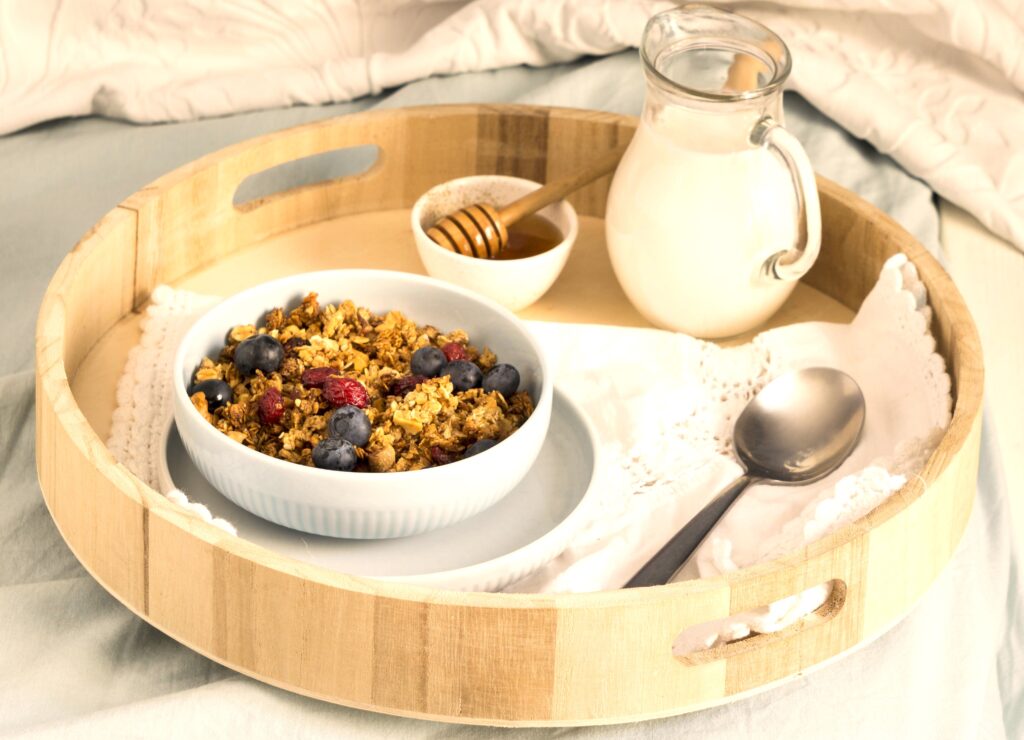Sleep is essential for overall health and well-being. Yet, many people struggle with getting quality sleep. While numerous factors influence sleep quality, diet plays a significant role. Incorporating natural foods known for their sleep-enhancing properties can be a simple and effective way to improve your sleep. This article explores various natural foods that promote deep sleep, offering a holistic approach to achieving restful nights.
Understanding Sleep and Its Importance
Before diving into the specific foods, it’s important to understand why sleep is crucial. Sleep is a complex biological process that helps the body and mind to rest and rejuvenate. It consists of several stages, including light sleep, deep sleep, and REM (Rapid Eye Movement) sleep. Deep sleep, in particular, is vital as it is the phase where the body repairs and grows tissues, builds bone and muscle, and strengthens the immune system.
Key Nutrients for Sleep
Several nutrients play a pivotal role in regulating sleep. These include:
- Tryptophan: An essential amino acid that the body uses to produce serotonin, which is then converted into melatonin, a hormone that regulates sleep.
- Magnesium: A mineral that helps activate the neurotransmitters responsible for calming the body and mind.
- Calcium: Works in conjunction with magnesium to help the brain use tryptophan to produce melatonin.
- Vitamin B6: A vitamin that helps convert tryptophan into serotonin and melatonin.
- Melatonin: A hormone that regulates sleep-wake cycles.
- Potassium: A mineral that aids in muscle relaxation and the regulation of sleep patterns.
Natural Foods That Promote Deep Sleep
Incorporating these nutrients through natural foods can enhance sleep quality. Here are some top natural foods to consider:
1. Almonds
Almonds are a great source of magnesium, which is known to improve sleep quality by reducing inflammation and lowering levels of the stress hormone cortisol. Additionally, almonds contain tryptophan and magnesium, which help relax muscles and promote sleep.
2. Walnuts
Walnuts are rich in melatonin, serotonin, and magnesium. Eating a handful of walnuts before bed can help increase your blood levels of melatonin, thereby improving sleep quality.
3. Cherries
Cherries, especially tart cherries, are one of the few natural sources of melatonin. Studies have shown that consuming tart cherry juice can improve sleep duration and quality.
4. Kiwi
Kiwis are high in serotonin, a neurotransmitter that helps regulate sleep. They are also rich in antioxidants and vitamins C and E, which have been shown to enhance sleep quality. Eating two kiwis an hour before bedtime has been linked to significant improvements in sleep onset, duration, and efficiency.
5. Bananas
Bananas are rich in potassium and magnesium, which help relax muscles and calm the body. They also contain tryptophan, which the body converts into serotonin and melatonin.
6. Oats
Oats are a good source of melatonin and complex carbohydrates, which help the body absorb tryptophan more efficiently. Eating a small bowl of oatmeal before bed can promote the release of serotonin and melatonin, aiding in better sleep.
7. Herbal Teas
Certain herbal teas have calming properties that can help promote sleep. Some popular choices include:
- Chamomile Tea: Contains apigenin, an antioxidant that binds to specific receptors in the brain that may promote sleepiness and reduce insomnia.
- Valerian Root Tea: Known for its sedative properties and ability to improve sleep quality.
- Peppermint Tea: Can help relax muscles and promote sleep.
- Lavender Tea: Known for its relaxing and sleep-promoting properties.
8. Leafy Greens
Leafy greens such as spinach, kale, and Swiss chard are rich in calcium and magnesium, which help the brain use tryptophan to produce melatonin. These greens also contain folate, which has been linked to better sleep quality.
9. Turkey
Turkey is well-known for its high tryptophan content, which the body uses to produce serotonin and melatonin. Consuming turkey before bed can help you fall asleep faster and improve sleep quality.
10. Fatty Fish
Fatty fish like salmon, tuna, and mackerel are rich in omega-3 fatty acids and vitamin D, both of which help regulate serotonin. Higher levels of serotonin can improve sleep quality and help you fall asleep faster.
11. Milk
A glass of warm milk before bed is a common remedy for sleep problems. Milk contains tryptophan, calcium, and vitamin D, all of which help regulate sleep.
Foods to Avoid for Better Sleep
Just as certain foods can promote sleep, others can hinder it. To improve your sleep quality, consider limiting or avoiding the following:
- Caffeine: Found in coffee, tea, chocolate, and some medications, caffeine is a stimulant that can interfere with sleep.
- Alcohol: While it may help you fall asleep initially, alcohol can disrupt sleep patterns and prevent deep sleep.
- Sugary Foods: High sugar intake can cause spikes and crashes in blood sugar levels, leading to restless sleep.
- Heavy Meals: Eating large or spicy meals before bed can cause discomfort and disrupt sleep.
Conclusion
Achieving deep, restful sleep is essential for overall health and well-being. By incorporating natural foods that promote sleep into your diet, you can enhance your sleep quality and wake up feeling refreshed and energized. Remember that a balanced diet, along with healthy sleep habits, can make a significant difference in your sleep patterns. Start making small changes today and enjoy the benefits of better sleep naturally.
Incorporating these natural sleep-promoting foods into your diet can significantly impact your sleep quality. However, it’s important to remember that individual responses to foods can vary. If sleep problems persist, it may be helpful to consult a healthcare professional to identify and address underlying issues.

